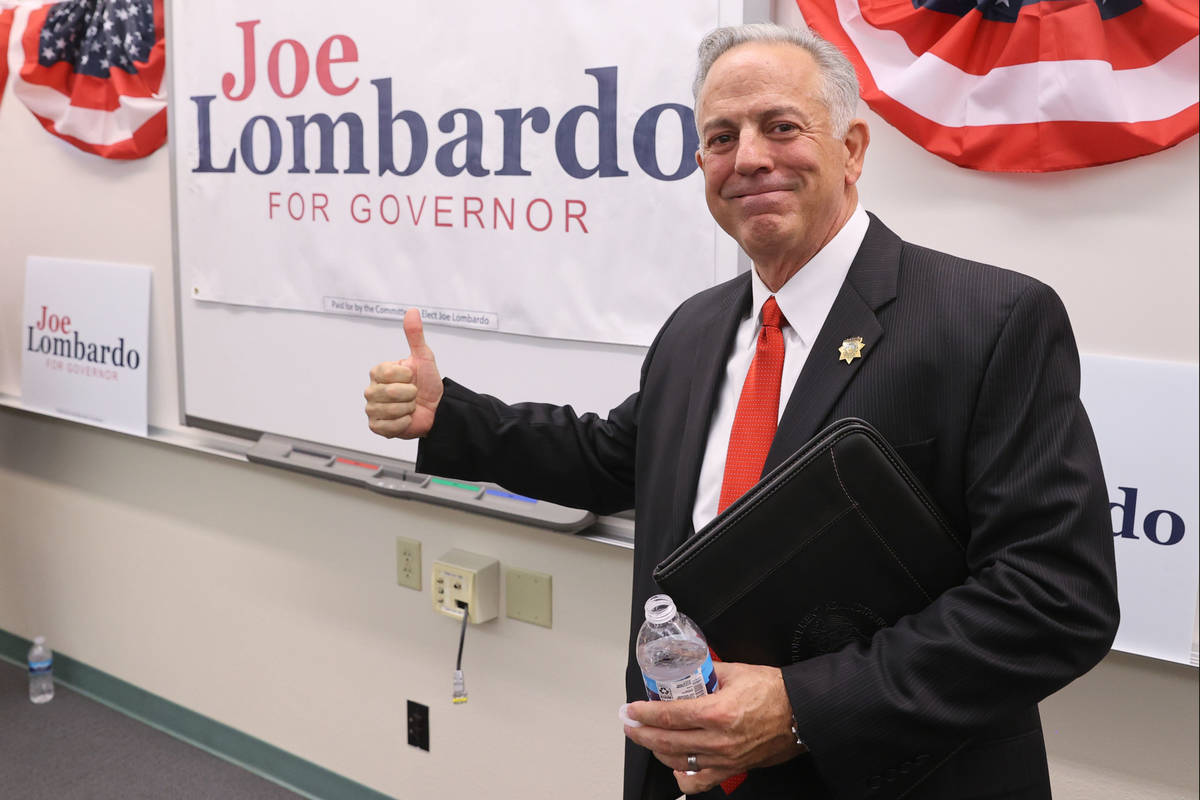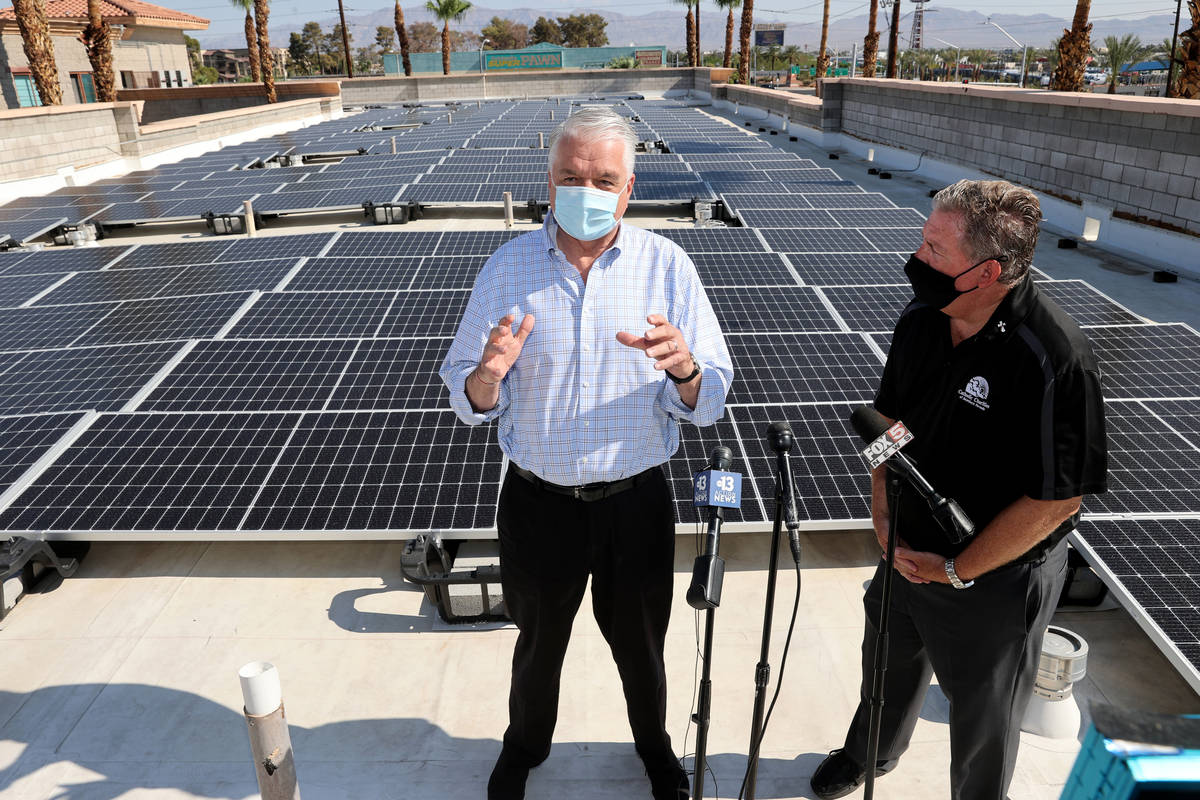STEVE SEBELIUS: Taxes and defunding the police
In politics, sooner or later, you see it all. In the governor’s race, Clark County Sheriff Joe Lombardo, a Republican, has declared he will veto any tax increases sent to him by the Legislature. But not too long ago Lombardo was advocating strongly in favor of a sales tax increase in Clark County, albeit to add badly needed officers to his department’s ranks.
And Lombardo faced off during that debate with incumbent Democratic Gov. Steve Sisolak — then on the Clark County Commission — who repeatedly blocked votes on the proposed sales tax increase. “You know I am philosophically opposed to raising taxes, but I keep trying to keep an open mind,” Sisolak said in 2013.
As governor, Sisolak has become less anti-tax, signing a mining tax increase after the 2021 session and an extension of two other levies in 2019 that were later ruled unconstitutional.
Lombardo warns that single-party rule in the Legislature will lead to higher taxes, and surely he has a point: When Republicans controlled both houses and the Governor’s Mansion in 2015, they passed the sweeping commerce tax. (Two other increases also took place under GOP governors, with bipartisan support in the Legislature.)
But Lombardo notes, correctly, that the big tax bills tend to happen in second terms, when incumbent governors no longer have to face voters.
Still, the sales tax struggle between Sisolak and Lombardo has a complex history.
In 2004, a frustrated Sheriff Bill Young suggested using a half-cent sales tax to pay for more officers throughout the county because officials didn’t want to raise property taxes. The voters approved a nonbinding resolution, and the 2005 Legislature granted the County Commission the authority to raises taxes by a quarter-cent, which commissioners did.
In 2013, after the Great Recession, the Metropolitan Police Department returned to Carson City seeking the other quarter cent. Lawmakers OK’d a 0.15 percentage point increase, assuming the commission could muster the necessary two-thirds vote. But with Sisolak leading the opposition, the effort repeatedly fell short.
After Lombardo was elected in 2014, he and Sisolak worked out a deal: The county would approve a 0.05 percentage increase if Metro would agree not to return for the remaining 0.10 percentage point. Lombardo agreed, and Sisolak joined the majority in voting yes.
“It was very difficult,” the sheriff recalled in an interview last week. Lombardo said he was “working the halls” in support of the tax while Sisolak was doing the same in opposition.
In 2016, after a noticeable increase in violent crime, Sisolak allowed that he’d had second thoughts about his earlier opposition to the full amount. “In hindsight, I would like to get a little more information and reflect back on that. The rise in violent crime contributed significantly to my change in attitude,” he said at the time.
It’s not exactly “defund the police.” More like, block funds for the police.
But now, a law enforcement chief executive who fought for money to hire officers is running against a Democratic incumbent who stood against it, at least initially.
Now, to be clear, Sisolak has never embraced “defund the police.” He got more money for Metro during his years as a commissioner and, as governor, signed the first collective bargaining agreement with state law enforcement officers.
By contrast, Lombardo has tepidly embraced “defund the police,” after a fashion.
“I’m on the record saying if you want to defund me, I have no problem with that as long as it’s (money) used appropriately in something that would benefit us in the law enforcement space,” Lombardo told The Associated Press. “When I talk about defunding the police, I’m talking about: Give me some resources that supports what we’re trying to do, and I’ll provide some of the funding out of my budget to support that.”
Lombardo also frankly admits that property taxes are a better, more stable way to fund police departments than sales taxes, which fluctuate with the economy. But asked if he’d sign a bill to adjust property tax caps to increase local government revenue, he demurs.
“Right now, we’re not in dire need of that,” he said. “The devil’s in the details.”
Sisolak’s team accuses Lombardo of trying to have it both ways.
“Whether it’s regarding immigration, vaccines, defunding the police or raising taxes, Lombardo continues to prove he is just another politician who will do or say anything to win,” Sisolak’s campaign said in a statement.
But politics eventually makes hypocrites of most its practitioners, as positions change with public moods.
Today’s anti-taxer was yesterday’s tax crusader, and yesterday’s tax opponent is today’s champion.
Contact Steve Sebelius at SSebelius@reviewjournal.com. Follow @SteveSebelius on Twitter.


















